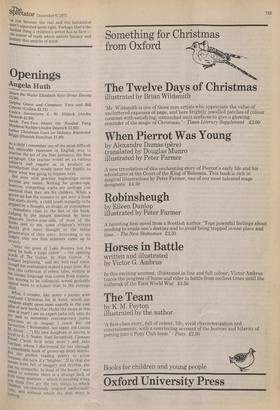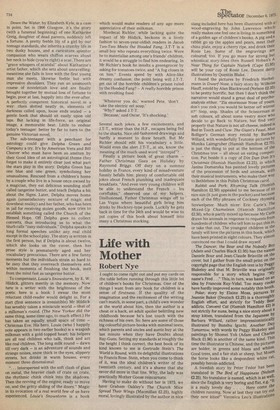Openings
Angela Huth
Clown the Water Elizabeth Kyle (Peter Davies £3.50) Delpba Green and Company Vera and Bill Cleaver (Collins £2.75)
Louie!s Snowstorm E. W. Hildick (Andre Deutsch £2.50)
Jacob Two-Two Meets the Hooded Fang Mordecai Richter (Andre Deutsch £1.95) rather Christmas Goes on Holiday Raymond Briggs (Hamish Hamilton £1.80) As a child I remember one of the most difficult but enjoyable exercises in English was to practise the art of the first sentence, the first Paragraph. Our teacher would set us various subjects and require us to produce an introduction that would leave her frantic to know what was going to happen next. But even with practice beginnings never become any easier. Writing for grown-ups, however, compelling starts are perhaps I:.ss essential than they are for children. While a grdwn-up has the stamina to 'get into' a book that starts slowly, a child needs instantly to be griPPed by a thought, an image, an atmosphere immediate clues to the feel of the book. Judging by the instant dismissal, by three disparate twelve-year-olds, of most of the books sent to me, some children's writers should give more thought to the initial Presentation of their story. According to my jtkiges, only one first sentence came up to scratch: "After the giant of Lake Martina lost his sister he built a large canoe" — the opening words of. The Guizer, by Alan Garner. "A brilliant beginning," said my well-read niece, though her enthusiasm waned a page later. But then this collection of ethnic tales, written in the uneasy language that comes from translation striving to be colloquial, would probably appeal more to scholars than to the average child.
What, I wonder, like many a parent with Confused Christmas list in hand, would our Children alight upon most eagerly in the vast Piles of new books that choke the shops at this time of year? I am no expert (who is?), only do My best to remember contemporary junior criticisms as in despair I reach for old favourites. ("Remember, not soppy old Louisa .. Alcott ...") My own daughter, at eleven, is to E. S. Nesbit, Noel Streatfeild, Clement Freud ("wish he'd write more") and Jane G ardara, whom I discovered for her through a remarkable book of grown-up short stories. But she prefers reading poetry to prose because she says, it's "brighter." If by that she illearis more full of imagery and rhythm, she ,as,_ MY sympathy. Inmost of the books I was to consider there is a strange lack of oath these qualities — which is puzzling when Y.09 think they are the two things to which Children unconsciously respond enthusiastically, and without which the best story is lacking. Down the Water, by Elizabeth Kyle, is a case in point. Set in 1900 Glasgow, it's the story (with a funereal beginning) of one Katharine Greig, daughter of dead parents, suddenly left a fortune. A pretty feeble lily of a girl by our teenage standards, she inherits a crumbylife in two dusky houses, and a caricature spinster companion who wears chiffon scarves about her neck to hide (you're right) a scar. There are "grave whispers of scandal" about Katharine's artist father, which she sets about unravelling: meantime she falls in love with the first young man she meets, likewise feeble but with impressive shoulders. They run an unsrnooth course of novelettish love and are finally brought together by mutual loss of fortune to begin, poor at last, happily into the ever-after. A perfectly competent historical novel in a way: clues slotted neatly in, elements of darkness called upon, loose ends sealed — a gentle book that should sit easily upon old laps. But lacking in life-force, an original image, a memorable beat. Little to endear today's teenager: better by far to turn to the genuine Victorian novel.
The sub-teenager with a penchant for astrology could give Delpha Green and Company a try. It's by American Vera and Bill Cleaver who must have been so smitten by their Good Idea of an astrological theme they forget to make it entirely clear just what part the stars play in the story. Delpha Green has one blue and one green, symbolising her unusualness. Rescued from a children's home by a couple who live in a house once owned by a magician, they eat delicious sounding stuff called tangerine butter, and teach Delpha a bit about the Signs. Later, Delpha moves home again (unsatisfactory mixture of magic and downbeat reality) and her father, who has been in jail for receiving stolen goods, now tries to establish something called the Church of the Blessed Hope. Off Delpha goes to collect converts, thus introducing us to what the blurb calls "zany individuals." Delpha speaks in long formal speeches unlike any real child except in the school play. The story is written in the first person, but if Delpha is about twelve, which she looks on the cover, then her prose style is prematurely aged and her vocabulary precocious. There are a few funny moments but the individuals strain so hard to be zany that they overreach themselves and, within moments of finishing the book, melt from the mind fast as tangerine butter.
To compensate, Louie's Snowstorm, by E. W. Hildick, glitters merrily in the memory. Now here is a writer with the brightness of the poets: here is a book I swear the most reluctant child-reader would delight in. For a start (first sentence is irresistible) Mr Hildick has sensibly taken a miniscule world — that of a milkman's round. (The New Yorker did the same thing, some time ago, to much effect.) He has taken an equally small space of time — Christmas Eve. His hero, Louie (who I happily note appears in two earlier books) is a waspish milkman with a gold-topped heart: his helpers are all real children who talk, think and act like real children. The long milk round — dawn till very dark — is an adventure of sounds and strange noises, snow thick in the eyes, slippery streets, hot drinks in warm houses, every moment three dimensional: ". . . Interspersed with the soft clash of glass on metal, the heavier clash of crate on crate, the rhythmic chink chink into the shadows. Then the revving of the engine, ready to move on, and the gritty sliding of the doors." Magic in its evocation of a real world few of us have experienced, Louie's Snowstorm is a book
which would make readers of any age more appreciative of their milkman.
Mordecai Richler, while lacking quite the impact of Mr Hildick, beckons in a lively fashion to seven-year-oldish readers in Jacob Two-Two Meets the Hooded Fang. J.T-T is a small boy who repeats everything twice. Were he to materialise among one's friends' children, it would be a struggle to find him endearing. In Mr Richler's book he insults a greengrocer by asking for tomatoes twice, and "A fog closes in on him." Events speed by with Alice-like dreamy confusion: the point being will J.T-T. get out of the horrible children's prison ruled by the Hooded Fang? — A really horrible prison with revolting food.
'Whatever you do,' warned Pete, 'don't take the electric eel soup.'
'Why?' asked J.T-T.
'Because,' said Oscar, 'It's shocking.'
Several such jokes, a few excitements, and J.T-T., wittier than the H.F., escapes being fed to the sharks. Nice old-fashioned drawings and hardly a moment to draw breath. But Mr Richler should edit his vocabulary a little. Would even the alert J.T-T., at six, know the meaning of the much-used word "intrepid"?
Finally a picture book of great charm — Father Christmas Goes on Holiday by Raymond Briggs. Off duty on a summer holiday in France, every kind of misadventure funnily befalls him: plenty of comfortable old jokes about French plumbing and inadequate breakfasts. "And even very young children will be able to understand the French — les cornflakes," observed one of my helpers. Disillusioned, Father Christmas wings off to Las Vegas where beautiful girl's bring him drinks by Hockney-type pools. Luckily he gets back in time for the 24th and would be wise to put copies of this book about himself into many a Christmas stocking.


































 Previous page
Previous page